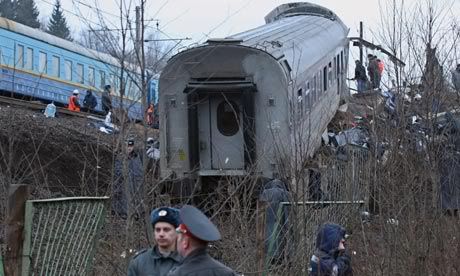
UGLOVKA, Russia – A powerful homemade bomb sent a high-speed Moscow-to-St. Petersburg train careening off its tracks killing at least 26 people in what seems to be an act of terrorism.
As many as 100 people were left injured by the disaster, and 18 remained missing Saturday night.
The attack on the Nevsky Express, a luxury train popular with government officials, tourists and business executives, was Russia's deadliest terrorist strike outside the volatile North Caucasus region since 2004. Among the dead were citizens of Belgium, Italy and Azerbaijan.
The force of the derailment scattered battered carriages over a remote stretch of track, trapping some of the injured for hours. By first light Saturday, luggage and pieces of metal lay in the muddy embankment in the drizzle, as survivors huddled under blankets by fires.
The injured were transported to hospitals in Moscow and St. Petersburg by bus, train and even helicopters, but some said the evacuation was agonizingly slow.
Yekaterina Ivanova, a wounded passenger, told the NTV television network that workers took at least four hours to free her from the wreck. "In the hospital, the doctors are better, the medical teams are working in harmony," she said. "The young people from the Ministry of Emergency Situations carried us out on stretchers, but other people in uniform were just standing there and staring, and no one was even helping to carry out the wounded."
Russia has been hit by a number of major terrorist attacks since the 1991 Soviet collapse, including the seizures of the Dubrovka theater in October 2002 and the taking of more than 1,000 hostages in Beslan's School Number One in September 2004 in which more than 330 people died when pro-Chechens seized a school in southern Russia.
Over the past year, the Caucasus has seen a surge in violence, including an increase in suicide bombings, assassinations and attacks by militants against police and government officials.
At the same time, rights activists say, government security services in the region have stepped up the use of kidnappings, extrajudicial killings and home-burnings against suspected militants and their relatives. The Moscow-based rights group Memorial issued a report this month accusing authorities of implementing "a policy of state terror."
President Medvedev issued a call for calm. "We need there to be no chaos, because the situation is tense as it is," he said. After previous terrorist attacks officials have sometimes jumped to conclusions about who is guilty; and terrorist attacks have sometimes been followed by mob assaults against innocent people from the Caucasus.
The same train service was attacked in 2007 when a similar bomb injured around 30 people. The authorities arrested two men from a region neighbouring Chechnya and blamed the attack on Islamist rebels. The man the authorities said masterminded that earlier attack – a former Russian soldier turned Islamist extremist – was never caught and is still on the run.
Survivor Boris Gruzd said the train driver braked severely. The passengers then spent 30 minutes unaware that the last three wagons of the 14-carriage train had flown off the rails. "The first wagon was 1.5-2kms away from the rest of the train. The second had completely flipped over. The third had come off the rails, but was near the main part of the train and was still standing vertically. As far as I know nobody from this wagon was seriously hurt." Gruzd said that the passengers immediately began collecting warm clothes and mattresses to help the injured. But he said it was extremely difficult to reach people trapped in the mangled carriages – with rescuers peering into the gloom and using flashlights.
Investigators said they had discovered a 3ft crater beneath the rails where the bomb had gone off. Reuters, however, said that its reporters at the scene had been unable to find it. Earlier, Russian news agencies had quoted transport officials as saying the cause may have been an electrical fault. Russia has a poor record of serious accidents caused by Soviet-era infrastructure.
yahoo, telegraph, guardian, times,






No comments:
Post a Comment